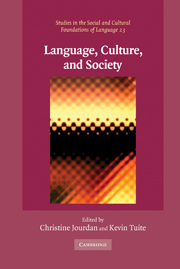Book contents
- Frontmatter
- Contents
- List of tables
- List of contributors
- Acknowledgments
- Introduction: Walking through walls
- 1 An issue about language
- 2 Linguistic relativities
- 3 Benjamin Lee Whorf and the Boasian foundations of contemporary ethnolinguistics
- 4 Cognitive anthropology
- 5 Methodological issues in cross-language color naming
- 6 Pidgins and creoles genesis: an anthropological offering
- 7 Bilingualism
- 8 The impact of language socialization on grammatical development
- 9 Intimate grammars: anthropological and psychoanalytic accounts of language, gender, and desire
- 10 Maximizing ethnopoetics: fine-tuning anthropological experience
- 11 Interpreting language variation and change
- References
- Index
- STUDIES IN THE SOCIAL AND CULTURAL FOUNDATIONS OF LANGUAGE
2 - Linguistic relativities
Published online by Cambridge University Press: 16 November 2009
- Frontmatter
- Contents
- List of tables
- List of contributors
- Acknowledgments
- Introduction: Walking through walls
- 1 An issue about language
- 2 Linguistic relativities
- 3 Benjamin Lee Whorf and the Boasian foundations of contemporary ethnolinguistics
- 4 Cognitive anthropology
- 5 Methodological issues in cross-language color naming
- 6 Pidgins and creoles genesis: an anthropological offering
- 7 Bilingualism
- 8 The impact of language socialization on grammatical development
- 9 Intimate grammars: anthropological and psychoanalytic accounts of language, gender, and desire
- 10 Maximizing ethnopoetics: fine-tuning anthropological experience
- 11 Interpreting language variation and change
- References
- Index
- STUDIES IN THE SOCIAL AND CULTURAL FOUNDATIONS OF LANGUAGE
Summary
The principle of linguistic relativity, as put forward by linguists and anthropologists in the 1920s and 1930s, holds that the characteristics of one's language can affect other aspects of life and must be taken into account. While the implications of language specificities and differences have been argued for hundreds of years, little of this history has been considered in recent discussions. In the modern West, the overwhelming tendency has been either to deny or affirm the importance of language differences depending on one's philosophical preference for universalistic explanatory models that seek causes or pluralistic essentialist models that seek understanding. The linguistic relativity principle has usually been identified with the latter position; but I will be arguing first that the work of Sapir, Whorf, and their mutual guru Franz Boas represents an effort to rethink language difference in a more complex way, one that is pluralist but not essentialist and that has yet to yield its full theoretical effects; and second, that much of the more recent work on this question reproduces the very oppositions that the Boasians struggled to get beyond. This is particularly evident in the switch in the 1950s from a principle of linguistic relativity to a “hypothesis of linguistic relativism” or “determinism”, often dubbed the “Sapir–Whorf hypothesis” that language determines thought, a classically essentialist position.
Universals, particulars, and relativity
Each of the six to ten thousand languages known (the number depends on how you define language versus dialect) is distinct at every level: in sound, lexicon, word order, grammatical categories, discourse patterns, and the culture of language.
- Type
- Chapter
- Information
- Language, Culture, and SocietyKey Topics in Linguistic Anthropology, pp. 47 - 81Publisher: Cambridge University PressPrint publication year: 2006
- 4
- Cited by



